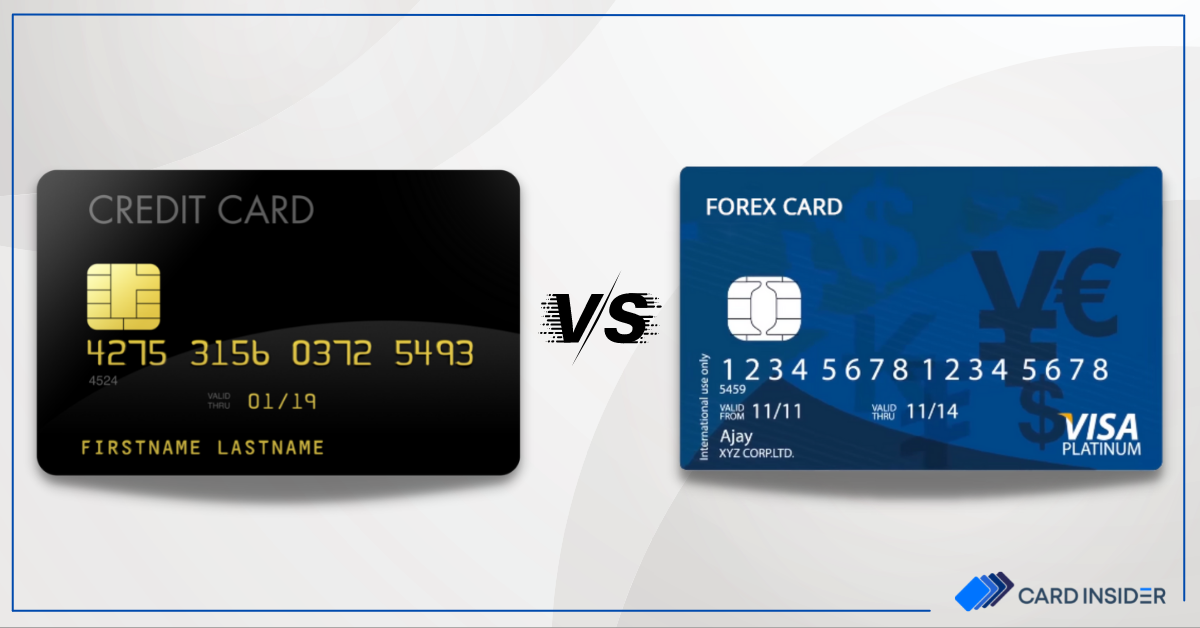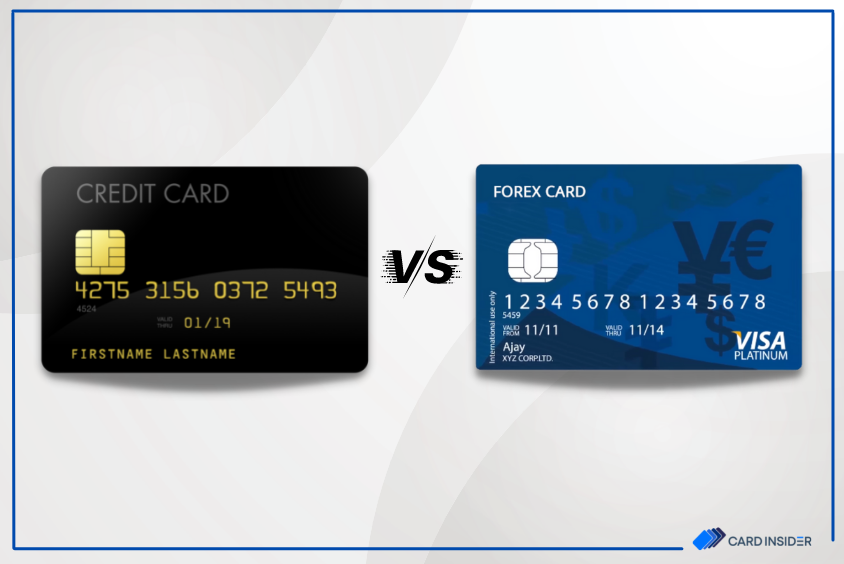Credit cards have become a part of our daily lives, from shopping purchases to fuel transactions we all love to use credit cards. And why not, as it offers plenty of benefits in the form of reward points/cashback. However, when traveling abroad, a credit card might be a good choice to carry along as it offers lounge access, reward points on international purchases, etc, but one thing that makes credit cards a bad choice is the forex markup charges that it carries.

The forex markup fee on credit cards makes international transactions more costly. Moreover, it will cost you a lot on withdrawing cash with credit cards at international ATMs. The forex cards, on the other hand, offer zero forex fee and help you to save more on your international transactions.
The Forex cards are accepted globally and you can make purchases in a number of currency options. These cards generally carry zero mark-up fee and you can withdraw cash in foreign currency anytime internationally without any cost. However, unlike credit cards, forex cards do not offer lavish privileges. Therefore, it might be difficult for individuals to choose from credit cards and forex cards for international travel. To help you out, we are here with this article, where you will find a detailed comparison between Forex cards and Credit cards. So keep reading to know more.
Credit Cards Vs Forex Cards: Meaning
Credit cards are one of the best financial instruments that provide individuals the ability to enjoy premium benefits. These cards are issued against a credit line and offer many great benefits. We all love to use credit cards for making transactions and enjoy saving in the form of reward points or cashback. Apart from the rewards on transactions, credit cards offer many other privileges like complimentary airport lounge access, fuel surcharge waiver, discount offers on dining or movies, and much more. When traveling abroad, credit cards offer many privileges which would assist you to make your travel comfortable.
The Forex Cards are prepaid Cards that can be loaded with foreign currencies in advance. The card allows you to store more than one currency and which can be used to make transactions in foreign countries. These cards carry zero forex markup fee and allow you to withdraw cash from international ATMs in foreign currency. Moreover, these cards carry no interest charges as they are prepaid instruments. Therefore, having a forex card when traveling abroad is a must.
Both credit cards and Forex cards offer great benefits to international travelers. But to make a choice one must consider the following points that will help you to differentiate between these two.
Forex Mark-up Fee
When you make transactions in a foreign currency with a credit card, you are charged a forex mark-up fee. These charges vary from card to card depending upon the card you carry (entry-level or Premium credit card). However, most credit cards charge 3.5% of the transaction amount as foreign markup fee for all international transactions. Some premium credit cards carry a lower charge of around 2%, but still, it makes the transaction value go up and costs you a lot when you use it for making international payments.
The Forex Cards, on the other hand, carry zero forex mark-up fee as the currency is already deposited in the card, provided that you use the same currency where it is applicable for example, using USD in the USA. If you have a currency for a transaction in a different currency then the conversion charges would apply. Therefore, one should carry multi-currency forex cards that allow you to deposit multiple currencies. One such card is State Bank Multi-Currency Foreign Travel Card which allows you to store multiple currencies in just one card.
Foreign Currency Rate Fluctuations
Making international payments with a credit card carries Forex fluctuation risks. As the Forex rates fluctuate every minute, the transaction value of the payments you make will depend upon the current rates prevailing. These can be high or low as per the market conditions. Therefore, international purchases through credit cards are a risky job.
However, in a forex card, the rates of the currencies are locked once you store them on your card. Therefore, when you make a payment in a foreign currency, the prevailing rates would not matter and the rate at which you stored the currency on your card would be applicable.
Traveling Privileges
When it comes to privileges in travel, credit cards have no match, as they offer world-class benefits including complimentary access to airport lounges, 24X7 Concierge services, and complimentary membership to the airline programs and hotels. Also, for every transaction, you make with credit cards you earn reward points which you can redeem later for a number of choices. With travel credit cards you can earn points in the form of Miles which are redeemable for booking tickets and much more.
Forex Credit cards are built to offer smoothness in international transactions at a very low cost. These cards generally lack such privileges as mentioned above. However, there are few forex credit cards that offer such privileges but in a limited manner. These are Axis Bank Club Vistara Forex Card and MakeMyTrip HDFC Bank ForexPlus Card.
Cash Withdrawals
When you withdraw cash using a credit card from ATMs, a cash advance fee of 3.5% is applicable on the amount withdrawn. These charges make the transaction cost go up and make credit cards a bad choice to withdraw cash.
The forex credit cards also carry a charge on cash withdrawals but these charges are generally lower and are fixed in terms of amount.
Issuance Fee
Credit cards are issued with a joining fee and also carry an annual charge which has to be paid to keep the card running. These charges are generally around Rs. 1,000 and may go up depending on the card you have. Travel credit cards are generally premium cards that carry around Rs. 3,000 to Rs. 5,000 as a joining or renewal fee.
The Forex cards carry a very little issuance cost and have no annual charge. The issuance cost for the forex cards is just Rs. 100 to Rs. 500. There are a few forex cards that carry a little higher fee.
Bottom Line
You must have got an idea behind the concepts of credit cards and Forex cards. The choice between the two cards totally depends upon you. If you just want a card that offers you slightly few travel privileges and minimal cost on international transactions, then having a forex card is a wise choice. However, if you are looking for a card offering great travel benefits, premium privileges, benefits in shopping, fuel, and much more then you should go for a travel credit card.
In case you have any doubt related to forex or credit cards, let us know in the comment section above.










1 Comment
I am in Australia now. I am using SBI prepaid forex card. But here in Australia, if you buy goods then as a tourist you can claim GST refund on those goods.
Their site mentions that refund will be allowed on credit cards, Australian bank account or cheque.
So my question is , if I use my forex card then will they refund me in my forex card ? Or should I take a cheque as I don’t own a credit card